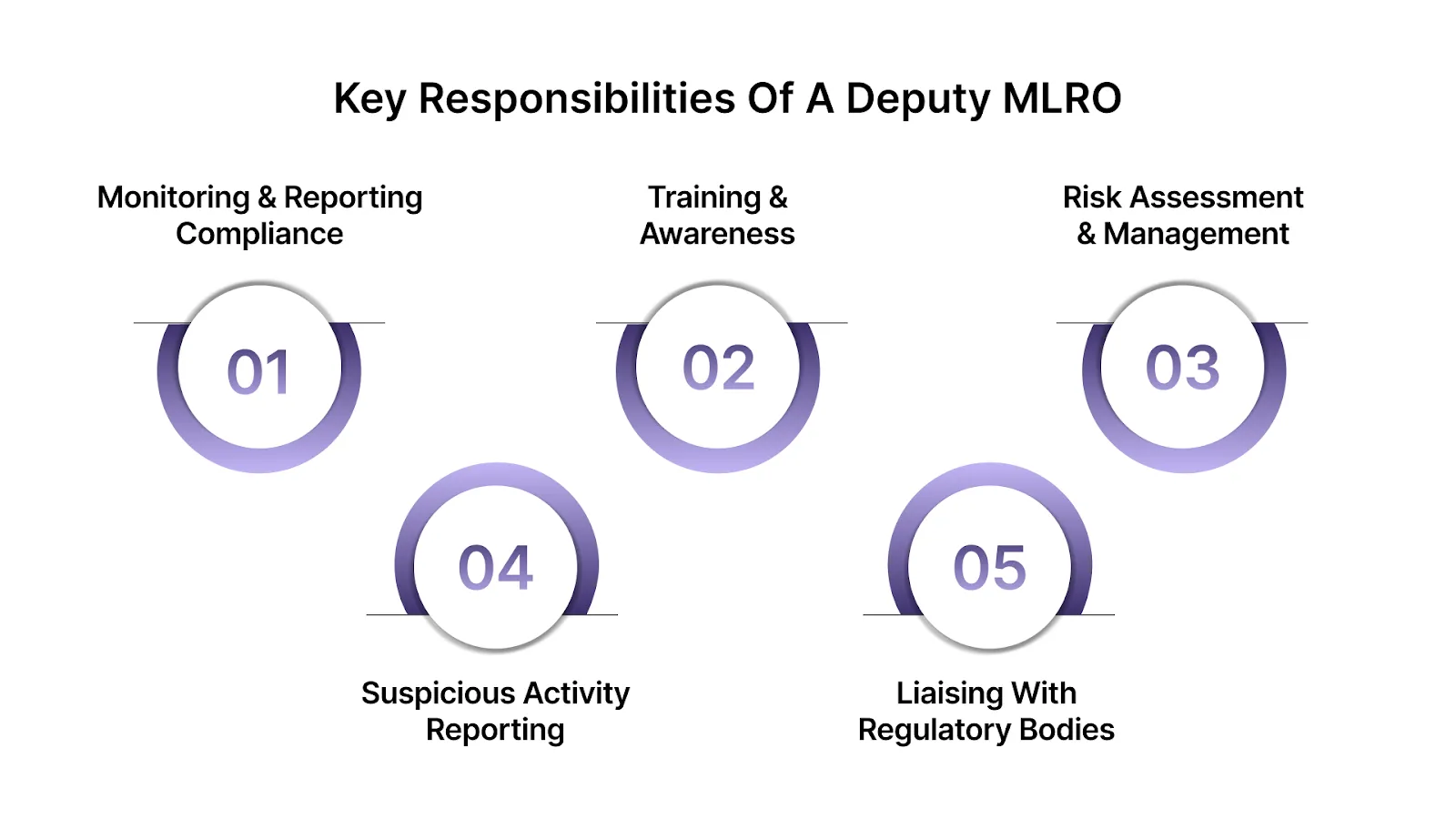Nov 3, 2025
How the Deputy MLRO Protects Investors from Fraud in 2025

By Fraxtional LLC

Financial crimes like fraud and money laundering are growing concerns for investors like you. These risks are particularly high in fractional ownership, where multiple investors pool resources for a single property. Without proper safeguards, these risks can jeopardize the security of your investment.
The role of Money Laundering Reporting Officers (MLROs) has never been more critical. In 2023, more than 75% of financial crime reports were filed through them, highlighting their importance. A Deputy MLRO ensures compliance and minimizes the chances of fraud in high-value transactions.
In this blog, we’ll explore the role of the Deputy MLRO in securing fractional ownership transactions. We’ll discuss their key responsibilities, how they ensure compliance with anti-money laundering laws, and the critical role they play in protecting your investments.
Key Takeaways:
- Role Clarification: Deputy MLRO ensures compliance with anti-money laundering laws, supporting the MLRO in monitoring financial transactions.
- Investor Protection: They prevent illegal activities by verifying that fractional ownership platforms meet legal standards.
- Qualification Requirements: The position requires AML certifications and experience in finance, law, or business.
- Global Compliance: Deputy MLROs ensure adherence to international laws, especially in cross-border investments.
- Fraxtional's Expertise: Fraxtional offers tailored AML solutions for fractional ownership platforms, ensuring secure, compliant investments.
Defining the Role of a Deputy MLRO

A Deputy MLRO supports the MLRO in ensuring compliance with anti-money laundering (AML) regulations. This role is crucial in sectors like fractional ownership, where multiple investors pool resources for a single property investment. The Deputy MLRO ensures that transactions are secure, legal, and transparent.
Role of the Deputy MLRO
The Deputy MLRO works under the MLRO to enforce AML policies, monitoring transactions to ensure compliance with both local and international regulations. They step in for the MLRO when needed, ensuring continuity in compliance efforts.
Key responsibilities include:
- Assisting the MLRO in developing and implementing AML policies.
- Ensuring transactions comply with all relevant laws.
- Acting as the primary contact for regulators during audits.
- Stepping in for the MLRO to maintain compliance during their absence.
With the role of the Deputy MLRO in mind, it’s essential to understand the specific tasks they are responsible for.
Also Read: How Fractional MLRO Governance Helps High-Risk Businesses?
Key Responsibilities of a Deputy MLRO
The Deputy MLRO’s primary responsibility is to monitor financial transactions and ensure they comply with AML regulations. They assist in spotting unusual activities that may suggest money laundering or other financial crimes. This is especially important in fractional ownership, where complex financial structures may be involved.
Here are the main duties of a Deputy MLRO:

- Monitoring and Reporting Compliance: Ensure that all transactions, particularly large or cross-border ones, comply with AML regulations.
- Training and Awareness: Educate staff and investors about AML policies and compliance procedures.
- Risk Assessment and Management: Assess the risk of financial crimes and take steps to mitigate them.
- Suspicious Activity Reporting (SAR): Prepare and submit detailed reports on suspicious activities to authorities.
- Liaising with Regulatory Bodies: Keep in regular contact with regulators to make sure the organization is meeting all necessary legal requirements.
The role requires not just expertise in AML compliance but also the proper qualifications and authority to carry out the necessary tasks.
Also Read: Role and Value of an Interim MLRO in Financial Firms
Authority and Qualifications Required for a Deputy MLRO

A Deputy MLRO holds significant authority within the organization. They must possess the necessary qualifications and experience to make compliance decisions, particularly regarding suspicious financial activities.
Key aspects of the Deputy MLRO’s qualifications and authority:
- Necessary Qualifications: A degree in finance, law, or business, along with certifications like ACFCS or ICA for expertise in AML.
- Authority within the Organization: The Deputy MLRO has decision-making power to ensure compliance and can act independently if needed.
- Training and Development: Ongoing training to stay updated on changes in AML laws and industry best practices.
To better understand the Deputy MLRO’s unique contributions, let's compare this role to that of a general Compliance Officer.
Also Read: How to Hire a Money Laundering Reporting Officer (MLRO)?
How the Deputy MLRO Role Differs from a Compliance Officer
While both roles focus on compliance, the Deputy MLRO specializes in preventing money laundering activities, while the Compliance Officer manages a broader range of regulatory requirements.
Here’s how the two roles differ:
Knowing the differences between these roles helps clarify which companies specifically require a Deputy MLRO.
Also Read: When to Hire a Fractional Compliance Officer
Which Companies Require a Deputy MLRO?

Any company dealing with significant financial transactions, such as fractional ownership platforms, must have a Deputy MLRO. This ensures that the company complies with AML regulations and protects its investors from financial crime.
Here are examples of businesses that need a Deputy MLRO:
- Real Estate Platforms: Companies offering fractional ownership must ensure AML compliance to protect investor interests.
- Financial Institutions: Banks and other financial entities that handle large-scale investments are required to have a Deputy MLRO.
- Cross-Border Operations: Businesses with international investors need a Deputy MLRO to comply with various regional regulations.
Now that you know which companies require a Deputy MLRO, let’s look at some real-world examples of this role in action globally.
Global Examples of the Deputy MLRO in Action
The Deputy MLRO plays a critical role in both U.S. and global real estate markets, where stringent AML regulations are in place to prevent financial crime. As fractional ownership platforms expand internationally, the Deputy MLRO ensures that all legal requirements are met.
Examples of the Deputy MLRO’s role in different markets:
- U.S. Market: The Deputy MLRO ensures compliance with the Bank Secrecy Act and USA PATRIOT Act, safeguarding real estate transactions.
- UK Market: They oversee compliance with the Money Laundering Regulations (MLR) 2017, ensuring transparency in real estate investments.
- Global Markets: In regions like the EU and UAE, the Deputy MLRO ensures that fractional ownership platforms meet international AML standards.
By looking at global examples, you can see how important this role is in maintaining compliance; now, let's discuss how Fraxtional can support your needs.
Also Read: How Anti-Money Laundering Officers Prevent Financial Crime
Why Choose Fraxtional for Your Deputy MLRO Compliance Needs?

Fraxtional provides tailored solutions for fractional ownership platforms, ensuring that each investment is secure and compliant with global regulations. Our team of experts specializes in managing AML compliance for real estate transactions, giving investors peace of mind.
Here’s why Fraxtional is the ideal partner for your Deputy MLRO needs:
- Expertise in Real Estate Compliance: Fraxtional offers specialized AML compliance solutions for fractional ownership platforms.
- Global Reach with Local Compliance: Our team ensures compliance with AML regulations across various global markets, including the U.S. and the UK.
- Transparency and Trust: Fraxtional builds trust by ensuring all transactions are compliant and secure.
- Regulatory Adherence: We stay up to date with the latest regulatory changes to ensure your investments are always compliant.
Stay audit-ready with expert AML reporting solutions. Contact us today to learn more about how we can support your compliance efforts.
Conclusion
The Deputy MLRO plays an essential role in maintaining security and compliance within fractional ownership platforms. By ensuring adherence to AML regulations, they protect both investors and the integrity of the investment process. At Fraxtional, we offer the necessary compliance leadership to ensure your investments are secure.
Explore our services today, and invest with confidence, knowing your investments are backed by expert compliance leadership.
FAQs
Yes, a Deputy MLRO can be held personally liable if they fail to ensure that proper AML procedures are followed and financial crimes go undetected.
A Deputy MLRO typically requires a degree in finance, law, or business, along with certifications such as ACFCS or ICA to demonstrate expertise in anti-money laundering.
The Deputy MLRO monitors transactions, evaluates risks, educates staff, and ensures all investments comply with AML regulations, helping to detect and prevent illicit financial activities.
A Deputy MLRO focuses on compliance with anti-money laundering regulations, while an internal auditor assesses financial records and ensures the overall accuracy and integrity of financial statements.
Yes, fractional ownership platforms handling large investments and multiple investors must have a Deputy MLRO to ensure compliance with AML laws and protect against financial crime.
blogs
Don’t miss these
Let’s Get Started
Ready to Strengthen Your Compliance Program?
Take the next step towards expert compliance solutions. Connect with us today.




